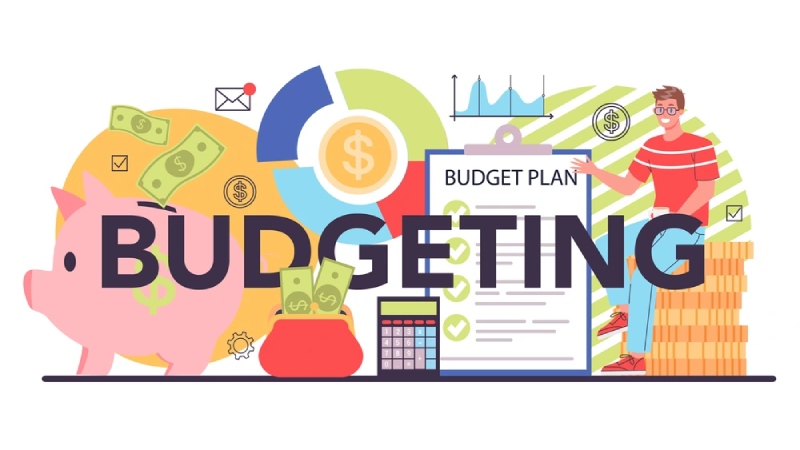Startup
Why Budgeting is Important Tips to Create a Successful Budget

Is it enough to worry about your money all the time? To improve your financial future and take charge of your finances, are you ready? Look no further! Our top 5 must-have tips for creating a successful budget are revealed in today’s blog post. These expert-backed budgeting techniques will help you achieve financial stability and peace of mind, regardless of whether you’re just starting or looking to revamp your current approach. Let’s get started and bid adieu to financial concerns and hello to a healthy pocketbook!
Why Budgeting is Important?
The process of developing a plan to manage and control your finances is known as budgeting. It entails establishing financial goals, monitoring income and expenses, and making strategic decisions on how to divide your funds. Although creating a budget can be difficult or time-consuming, it is a necessary tool for achieving success and financial stability.
- Help in understanding your current financial situation
Making a successful budget starts with evaluating your existing financial status. This entails making an inventory of all of your sources of income, including investments and salaries, as well as all of your out-of-pocket expenses, such as bills, groceries, and frivolous spending. By creating a budget, you can have a clear picture of your cash flow and use that information to decide how much you can save or spend each month.
- Enables you to make reasonable goals
You can identify long-term financial goals and set attainable targets by creating a budget. Budgeting can help you determine exactly how much money you need to set aside each month, for example, if your goal is to save for a down payment on a house in five years. This keeps money from getting wasted and guarantees that there will be enough money when it’s needed.
- Promotes mindful spending
Budgeting has many advantages, one of which is that it promotes careful spending practices. There is less of a chance to overspend on non-essential items or make impulsive purchases when each dollar in the budget has a designated use. We are more likely to adhere to our financial goals if we make deliberate spending decisions based on our budgetary constraints.
- Helps pay off debt
Making a budget can also help you pay off debt more quickly. Through careful budget planning, people can identify unnecessary expenses and redirect more funds toward debt payments, allowing them to pay off their debts faster than they ever would have thought possible.
- Brings comfort to the mind
Finally, by lowering the stress associated with money, having well-planned budgets can bring peace of mind. Unexpected costs are common and can include auto repairs or medical bills. But with a budget in place, it’s possible to account for and plan for these costs without suffering a lot of financial strain.
Identify Your Income and Expenses
To successfully manage your finances and achieve financial stability, you must create a budget. Determining your income and expenses is one of the first steps in making a budget.
- Determine Your Income:
Establishing a budget starts with figuring out all of your income sources. This can include any income you receive from commissions, tips, bonuses, rental income, interest from investments, and other sources of funding. To make sure you are not underestimating or overspending your available funds, it is critical to have a precise estimate of your income.
To determine how much money you usually make each month, it might be useful to review prior pay stubs or bank statements. It’s advisable to use the average for the previous few months if your income fluctuates from month to month.
- Make an Expense List:
Making a list of all of your expenses comes next after figuring out your income. These expenses fall into two categories: fixed and variable.
Fixed expenses are those that don’t change each month and include things like utility bills, rent or mortgage payments, insurance premiums, and car payments. Monthly expenses that are subject to variation include groceries, entertainment, and eating out. You should never undervalue your variable costs because they can mount up rapidly.
- Calculate Your Total Expenses:
Add up all of your fixed and variable expenses to determine the total amount after you’ve made a list of all of your monthly outlays. This will show you exactly how much money you need each month to cover your essential expenses.
Apart from the computation of the total monthly expenses, take into account any semi-annual or annual payments (like car insurance) that must be divided by 12 months and included in the monthly budget.
- Deduct Expenses from Income:
The next important step is to deduct your total monthly expenses from your total monthly income. A positive number indicates that you have enough money to pay for your expenses, which is the ideal outcome for this calculation. It’s time to evaluate where you can make changes and reduce wasteful spending if your expenses are higher than your income.
Set Realistic Goals
Making a successful budget requires first establishing some realistic goals. Without measurable goals, it’s simple to become overwhelmed or discouraged, which can result in completely giving up on the budget. You will have a clear path to success and financial stability if you set realistic goals.
Before creating any budgetary goals, it is important to have a thorough grasp of your existing financial status. This entails assessing your earnings, outlays, debts, and savings. Before you can make any significant goals, you must have a clear understanding of your finances.
It’s time to decide where you want to be financially in the future after you’ve evaluated your current situation. To help you monitor your progress and maintain motivation, your goals should be precise and quantifiable. For instance, state how much you want to save each month or year rather than just saying, “I want to save more money.”
Setting priorities for your goals according to their urgency and significance is also crucial. This will make it easier to decide which ones require attention right away and which ones can wait. The majority of experts advise starting with short-term objectives since they are simpler to accomplish and provide you with a sense of satisfaction sooner.
Making sure your goals are reachable within your means is another essential component of setting realistic goals. Take into account elements like your income, spending, debt, and other financial responsibilities. Establishing unrealistic or unduly ambitious goals will only cause dissatisfaction and possibly failure.
Setting reasonable deadlines for completing the goals is just as important as having realistic expectations for the actual objective. Rushing the process could leave little time for habit changes or spending pattern adjustments while giving yourself too much time could make you feel unmotivated or unurgent.
When making financial goals, try not to compare yourself to other people. Everybody has different financial circumstances, so what might work for someone else might not work for you. Instead of attempting to keep up with others, keep your attention on your own development.
Prepare yourself to make changes as you go. It’s normal for your goals to shift as your financial situation does. It’s critical to periodically review and modify your budget to make sure it stays applicable and efficient.
Monitor Your Expenses
Making a successful budget requires keeping track of your expenditures. It gives you a clear picture of where your money is going, allowing you to make adjustments where necessary and spot areas where you might be overspending. This encourages more responsible and prudent spending practices in addition to helping you stick to your budget.
Getting all of your financial statements together, including credit card statements, bank statements, and receipts from the previous few months, is the first step in keeping track of your spending. This will provide you with a realistic picture of your spending over time. It’s time to group your documents into different expense categories, like groceries, utilities, rent or mortgage payments, entertainment, etc., once you have all the required paperwork.
The next step is to decide which approach—using a spreadsheet or an app for budgeting—is most effective for keeping track of your spending. Select the option that works best for you and stick with it all the time. You can easily see where the majority of your money is going by breaking down and analyzing your expenses by category by creating monthly budgets on these platforms.
Using automation’s power is one way to simplify this process. Configure automated notifications for when your bills are due or for any activity on your accounts. This reduces the likelihood of missing a payment and serves as a prompt to stick to your spending plan.
Establishing spending caps or targets for each category on past spending trends and personal preferences is another effective approach to monitoring expenditures. These restrictions might involve limiting the amount of time spent dining out or lowering needless subscription services that you may be using without noticing.
The idea that tracking expenses necessitates laborious record-keeping every day is a common one; in actuality, checking in once or twice a week should be sufficient. Regularly reviewing those records makes it easier to spot overspending trends early on and make necessary adjustments before things get too out of control.
Nevertheless, it’s important to remember that there is no one-size-fits-all method when it comes to tracking expenses. Finding the solution that best suits your needs and way of life is crucial. Finding the best approach will ultimately make budgeting much easier, though it might require some trial and error.
Make Modifications as Necessary
Making a budget is a continuous process that needs to be reviewed and adjusted frequently to maintain its efficacy. Your budget should adapt to your priorities and financial situation. We’ll go over the procedures in this section for modifying your budget as needed.
- Recognize Income Changes: Monitoring any changes in your income is the first step in making any necessary adjustments to your budget. Congratulations if you have been given a raise or bonus! It also implies that you should review your budget, though. You can save more of this extra money or use it to pay off debt more quickly.
On the other hand, be sure to adjust your expenses if you are facing a decrease in income as a result of a job loss or salary cut. Reducing non-essential spending might be necessary while you’re looking for a job or trying to get your finances back on track.
- Evaluate Your Expenses: Budgets are based on estimates and assumptions about our monthly spending on a variety of categories, including housing, groceries, utilities, and other expenses. But it’s important to periodically check these costs to make sure they match reality.
Consider reducing these costs or finding other ways to enjoy them without going over budget, for example, if you find that you are spending more than you had planned on entertainment or eating out.
- Review Your Goals: Regularly reviewing your financial goals is a crucial component of budget adjustment. Congratulations if you’ve completed any of them ahead of time, such as paying off debt early or setting up an emergency fund earlier than you anticipated!
But given this success, you might be able to reevaluate your spending by putting money toward other long-term objectives like retirement savings or real estate investment.
- Take Into Account Lifestyle Changes: Our needs and desires can change from year to year based on individual circumstances like getting married, starting a family, or purchasing a new home. Our lifestyles change over time.
As a result, it’s vital to review and modify your budget in light of these lifestyle adjustments. Pay close attention to how your budget fits your current priorities and steer clear of unneeded expenses that don’t fit in.
Apply Budgeting Apps and Tools
These applications can give users a thorough financial picture and let them keep an eye on their debt, savings, income, and expenses all in real-time. They frequently have functions like spending classification, budget creation for various categories, goal-setting, and reminders, and the ability to create visual charts and graphs to monitor progress.
Convenience is a key benefit of adopting budgeting apps; users can keep track of all their financial data in one location and eliminate the need to manage numerous spreadsheets or documents. This facilitates maintaining organization and helping you make wise financial decisions.
Additionally, a lot of budgeting apps come with automatic credit card and bank account synchronization. This eliminates the need for human input and enables smooth transaction tracking. Additionally, some have features that allow users to be notified when bills are due or if payments are overdue.
The ability to create recurring budgets is another feature that sets budgeting apps apart. For instance, you can create a recurring expense in your app for the $200 you spend on groceries every month if you know that’s how much you spend. This helps create accurate budgets based on historical spending patterns and saves time.
Additionally, some budgeting apps come with sophisticated features like options for retirement planning and investment tracking. For people trying to save for long-term objectives like home ownership or retirement planning, these can be helpful.
The market currently offers several budgeting apps in both free and paid versions. Basic versions are frequently sufficient for daily use, even though paid versions may offer more sophisticated features or individualized customer support.
To select the budgeting app that best meets your needs and preferences, you should, however, conduct in-depth research and read reviews before making your decision. The app’s security must also be guaranteed because it will have access to private financial data.
Conclusion
In conclusion, making a good budget is a critical first step on the road to reaching your objectives and financial security. You can take control of your finances and achieve your desired results by adhering to these 5 crucial tips: setting clear goals, tracking expenses, giving needs priority over wants, allowing for flexibility, and reviewing on a regular basis. Recall that developing sound financial practices takes time, so practice patience with yourself as well. It is possible to make a budget that suits you and paves the path to a better financial future with the right diligence and discipline.
-

 Business4 weeks ago
Business4 weeks agoHow to fill MSME Form 1? Step-by-Step Guide
-

 Gadget4 weeks ago
Gadget4 weeks agoAfter Grand Success on BLDC Ceiling Fan, Eff4 Is Launching Smart Bulb
-

 Festivals & Events4 weeks ago
Festivals & Events4 weeks agoGoogle Celebrates Cherry Blossom Season with Animated Doodle
-

 Business2 weeks ago
Business2 weeks agoPrakash and Kamal Hinduja: Driving Social and Environmental Change
-
Education3 weeks ago
Fred DuVal: University Leadership as a Critical Resource for Climate Change Research and Life-Saving Solutions
-

 Sports4 weeks ago
Sports4 weeks ago2025 NASCAR Craftsman Truck Series Baptist Health 200 at Homestead-Miami Speedway: Race Preview, Prediction, Schedule, Entry List, Drivers to Watch and How to Watch
-

 Health2 weeks ago
Health2 weeks agoThe Hinduja Brothers Commitment to Global Health: Empowering Communities Across Borders
-

 Cryptocurrency2 weeks ago
Cryptocurrency2 weeks agoDesigned For The Masses: How Akasha (AK1111) Is Unlocking Crypto For The Next Billion Users

























